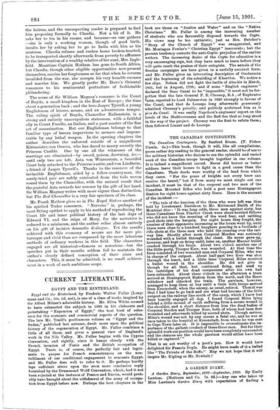CURRENT LITERATURE.
EGYPT AND THE HINTERLAND.
Egypt and the Hinterland, by Frederic Walter Fuller (Long- mans and Co., 10s. Gd. net), is one of a class of books inspired by Sir Alfred Milner's admirable history. Mr. Silva White seemed to have exhausted the subject in 1899 in his elaborate and painstaking " Expansion of Egypt," the best book of refer- ence for the economic and commercial aspects of the question. The late Mr. Trail's posthumous volume on " Egypt and the Sudan," published last autumn, dwelt more upon the political history of the regeneration of Egypt. Mr. Fuller combines a little of all these, and gives a general view of England's work in the Nile Valley. Mr. Fuller begins with the Cyprus Convention, and rightly, since it hangs closely with the French invasion of Tunis and the British occupation of Egypt. Tunis is, of course, the perfectly fair and legiti- mate to guogus for French remonstrances on the non- fulfilment of our conditional engagement to evacuate Egypt, and Mr. Fuller does well to refer to it. He perhaps hardly lays sufficient stress upon the even more conclusive reply furnished by the Drummond Wolff Convention, which, had it not been rejected at the instance of France and Russia, would prob- ably have brought about the withdrawal of the army of occupa- tion from Egypt before now. Perhaps the best chapters in the book are those on "Justice and Water" and on the "Native Christians." Mr. Fuller is among the increasing number of students who are favourably disposed towards the Copts. His views may be too optimistic, just as Mrs. Butcher's " Story of the Church of Egypt" was exaggerated, and Mr. Montagne Fowler's " Christian Egypt" inaccurate ; but the present tendency corrects the anti-Coptic prejudice of the earlier writers. The increasing desire of the Copts for education is a very encouraging sign, but they have much to learn before they will quite merit the praises of their eulogists. The annals of the Soudan campaigns are here given in a usefully succinct form, and Mr. Fuller gives an interesting description of Omdurman and the beginning of the rebuilding of Khartilm. We notice a few slips. Nelson did not fight the battle of Abu-kir in March, 1801, but in August, 1798; and if some "English engineers" declared the Suez Canal to be "impossible," it must not be for- gotten that the late General F. R. Chesney, R.A , of Euphrates same, reported to Lord Palmerston in 1830 strongly in favour of the Canal, and that de Lesseps long afterwards generously admitted Chesney's priority, and publicly acclaimed him as is pere du Canal. It was really Napoleon's engineers' report on the levels of the Mediterranean and the Red Sea that so long stood in the way of the project. Chesney was the first to refute them ; then followed Linant and de Lesseps.










































 Previous page
Previous page